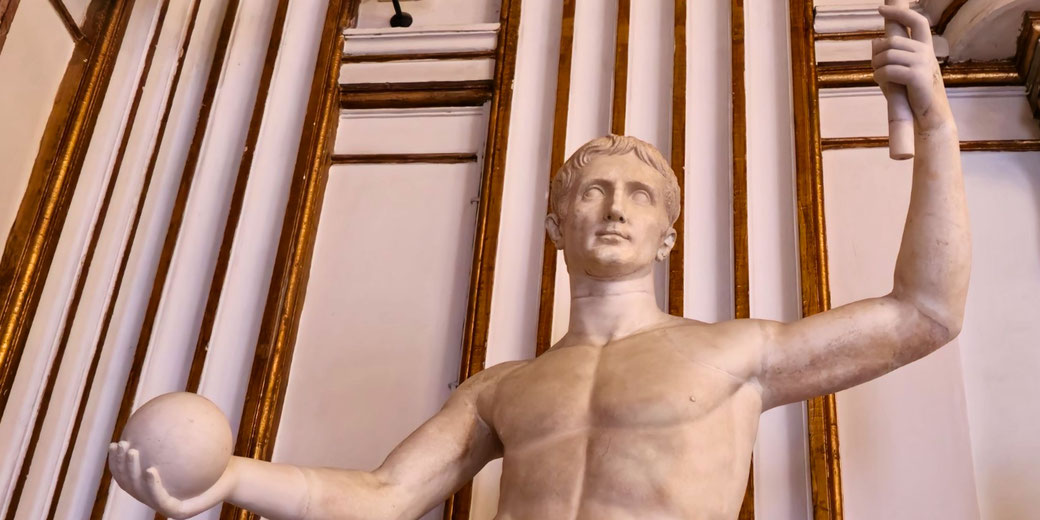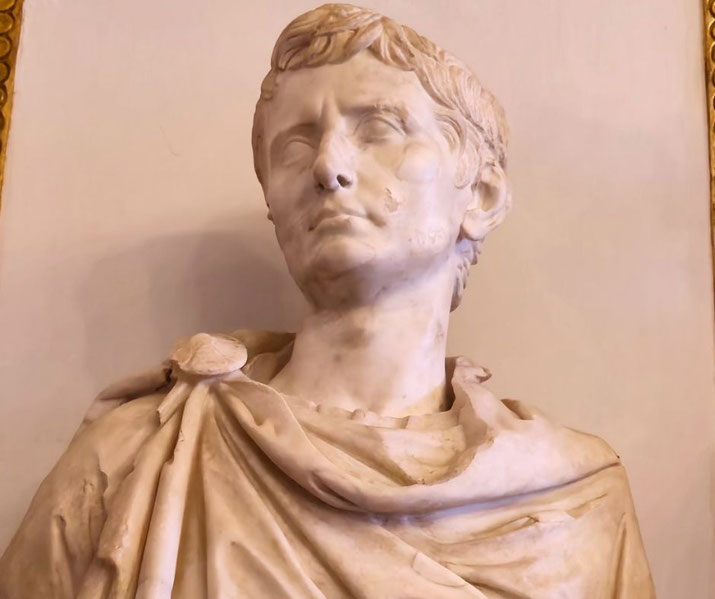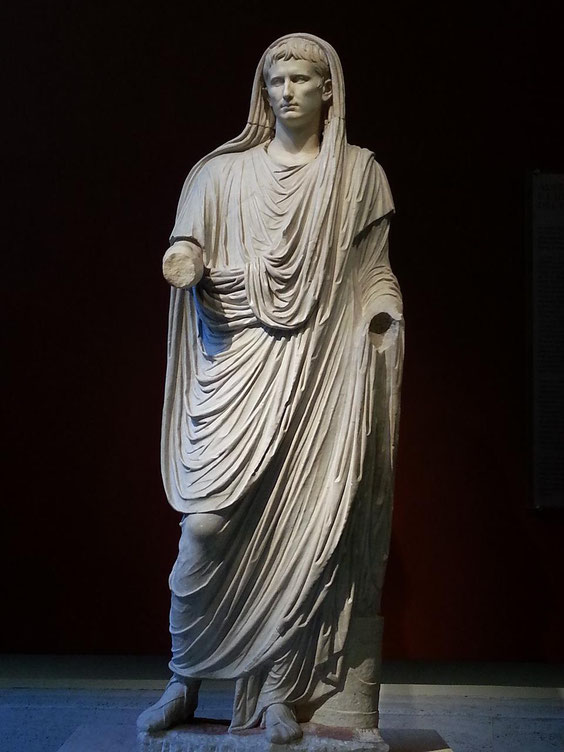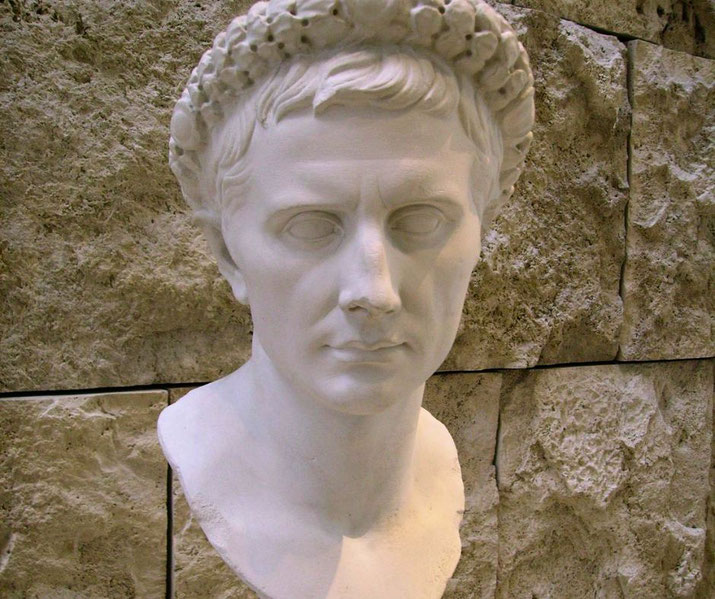How Octavian became the emperor Augustus

In the chaotic years after Julius Caesar's death, one man emerged as the clear successor: Octavian. This is the story of his rise to power and how he became the first Roman emperor, named Augustus.
Through a series of strategic alliances and decisive battles, he heralded in the end of the Roman Republic and the dawn of the
Roman Empire.
Ultimately, Octavian was the first man to truly become the undisputed ruler of Rome.
Octavian's early life
Octavian was born Gaius Octavius on September 23, 63 BC, in Rome. His great-grandfather, Gaius Octavius, was a military tribune during the Second Punic War.
His father, also named Gaius Octavius, had been governor of Macedonia. His mother, Atia, was the niece of Julius Caesar, which made the young Octavian the great-nephew of Caesar.
In 45 BC, Octavian travelled to Spain where he joined Julius Caesar on his military campaign against the remaining followers of Pompey the Great during the Civil War.
Apparently, Caesar was impressed with Octavian and, on returning to Rome, changed his will so that Octavian would become the heir to his wealth and estates.

Why was he adopted by Julius Caesar?
On the 15th of March 44 BC, Julius Caesar was assassinated, and another civil war broke out.
At the age of eighteen, Octavian returned to Rome to accept his position as Caesar's heir, as stipulated in his will.
The Senate confirmed this decision and, in respect for his late uncle, Octavian took the name Gaius Julius Caesar.
So, even though we call him Octavian, during his life, he would have been addressed as 'Gaius Julius Caesar'.
In order to hunt down and punish the assassins of his great-uncle, Octavian formed a political and military alliance with two other leading men in Rome.
Octavian, Antony, and Lepidus formed the Second Triumvirate in 43 BC.
In January of 42 BC, the Senate declared that Julius Caesar had become a god upon his death.
Not only was this a public way of honouring the memory of the dictator, but it also gave Octavian an additional claim to power and fame.
Now, he was not just the son of Caesar, he was also the 'son of a god'.
The three men then set out to capture Caesar's assassins and bring them to justice. After a series of battles, the pursuit culminated at two engagements known together as the Battle of Phillipi on the 3rd and 23rd of October 42 BC.
It was at this battle that the Second Triumvirate defeated Brutus and Cassius, the most famous leaders of the assassination. Rome was now firmly in the hands of Octavian, Antony, and Lepidus.
As a show of the strength of their alliance, Octavian gave his sister, Octavia, in marriage to Mark Antony in October of 40 BC.
The Second Triumvirate and the war with Mark Antony
However, the alliance between Octavian, Antony, and Lepidus did not last long.
Each of the men sought to become the preeminent person in the Roman republic and focused on their own developing power bases.
Lepidus took an army to the western Mediterranean to combat Pompeiian rebels there who were led by Sextus Pompeius, while Mark Antony prepared to head to the eastern Mediterranean. Octavian focused his energies on Italy and Rome itself.
The first member of the triumvirate to lose power was Lepidus. In 36 BC, after defeating the rebels, Octavian accused him of seeking to raise his own rebellion against Rome and even seeking to seize Sicily.
In a humiliating turn of events, Lepidus' own legions defected to Octavian, which left Lepidus without either political or military power.
He was forced to formally step down from the alliance and enter political retirement.
With the departure of Lepidus from the competition, it only left Octavian and Antony as the two leading men in Rome.
The Senate feared that this situation would result in another devastating civil war between the two men.
While Octavian consolidated his power in the city of Rome, Mark Antony travelled to Egypt, where Cleopatra was the reigning pharaoh.
Much to Octavian's dismay, Antony and Cleopatra began a public romantic relationship.
In response, Octavian accused Antony of abandoning his responsibilities in Rome, and for dishonouring his own sister.
Mark Antony officially divorced Octavia in early 32 BC.
Octavian, assuming that a showdown was coming between the two men, accused Antony of wanting to establish a monarchy and rule from Alexandria with Cleopatra.
He pointed to his behaviour in Egypt to justify these claims, such as his marriage to Cleopatra and his alleged desire to be buried in Egypt, which he apparently discovered when reading Mark Antony's will.
In 32 BC, the Senate stripped Antony of all his titles and declared war on Cleopatra. Octavian was now at war with his former ally, Mark Antony.
The Senate supported Octavian, and civil war broke out. On the 2nd of September 31 BC, the two men's armies and navies met at the Battle of Actium.
Octavian's forces were victorious, and Antony and Cleopatra fled to Egypt.
In 30 BC, Antony and Cleopatra committed suicide, and Octavian was the undisputed ruler of Rome.
The 'First Settlement' of 27 BC
Following the defeat and death of Mark Antony, Octavian was faced with the task of governing a Roman state that that had been shattered by decades of civil war.
During the conflicts that followed the collapse of the Second Triumvirate, Octavian had ruled his territories through the direct powers of the dictatorship.
However, now that the threat of war was over, many Romans considered that Octavian no longer needed those supreme powers.
Over the next few years, Octavian may have feared that what had happened to Julius Caesar - the assassination by those fearful of a dictator over Rome - could happen to him.
Consequently, Octavian decided to give up the supreme powers he had and return them to the Senate in January of 27 BC.
However, the Senate decided that it was in Rome's best interests to allow Octavian to keep many of those powers in order to prevent further civil conflict.
The surrender of his powers, followed by their return by the Senate occurred in a public Senate meeting, and was known as the First Settlement.
As a result of the First Settlement, the Senate provided Octavian with the legitimacy he needed to persuade his fellow Romans that he did not 'take' power but was 'given it' by the Senate.
As part of the First Settlement in 27 BC, Octavian was given personal control of the provinces of Spain, Gaul and Syria for ten years, which was in addition to his personal territory of Egypt, which he had taken in 30 BC.
These regions also happened to be where most of Rome's legions were stationed, which meant that it gave Octavian most of the miliary power.
Octavian said that he had the power to do this through his auctoritas, which is a Latin word that means something like 'influence' or 'personal charisma'.
However, in his role as consul, he also had the power of imperium, which gave him authority over the armies.
During this settlement, the Senate also gave him the special title (known as a cognomen) of 'Augustus', which effectively marked him as the very first Roman emperor.
The title 'Augustus' was an invented word that had religious connotations, but meant something like 'the revered one', 'holy one', or 'the most awesome one'.
Augustus would also take the important position of princeps, which is a title that means 'first person'.
The princeps had the honour of being the most important person in the Senate, which allowed him to speak first in Senate meetings.
In return for Augustus accepting these new powers and titles, he agreed to certain conditions.
He would share power with the Senate, he would not make himself king, and he would restore the Republic when he died.
Augustus was already popular with the soldiers of his army, and he also gained the title of 'Imperator', meaning 'ultimate military commander'.
It gave him the power to assign and remove the commanders of the Roman legions stationed throughout the empire.
As a result, he became indirectly responsible for every military victory. This allowed Augustus to claim personal achievements in wars he never personally was involved in.
The 'Second Settlement' of 23 BC
Following the First Settlement, Augustus continued to hold one of the two consulships every year. In fact, he was consul every year from 31 to 23 BC.
This power of imperium that came with the position of consul gave him additional authority to rule Rome.
However, in 23 BC, Augustus fell ill, and many senators feared that he would die. At that point, there was still no clear successor to Augustus, and his death could have sparked another round of civil wars.
Thankfully, Augustus recovered, but the Senate thought that they needed a second round of 'settlements' to help prepare for the eventual imperial succession.
The Second Settlement was made in 23 BC. This time, it was decided that Augustus should step down from being one of the consuls every year.
However, in a unique move, it was decided that he should retain all of the powers of the consul (imperium) without having to hold the position.
He would hold this power, and the military command that came with it, for the rest of his life.
However, since the regular consuls also held the power of imperium, the Senate worried that it might trigger another round of tensions between people of equal power.
So, to make it clear that Augustus' imperium superseded all others, they granted him the power of imperium maius procunsulare, which is essentially 'supreme military comander'.
Also, as part of this agreement, he was also given the 'power of a tribune' (tribunicia potestas), without actually receiving the position of tribune.
The powers of the tribuneship gave him the authority to call the Senate to meet at any time, propose new laws, and allowed him to cancel any decision the Senate made that he didn't like (known as the veto).
The ability to possess the powers of the tribuneship and the consulship without holding the position themselves was a clever way of manipulating traditional republican political.
However, in this way, Augustus could make it look like he was continuing the old republican system of politics while amassing all the powers he wanted.
Even more powers and honours
Despite the extraordinary powers and authority that Augustus had recieved as a result of the First and Second Settlements, over the next few decades, the Senate would continue to add more.
Some of these were given in response to various crises or events, while other seemed to be offered as a kind of 'gift' as a show of gratitude by the Roman people.
In 12 BC, Augustus became the pontifex maximus, which was the high priest of Roman religion.
In theory, this gave him the authority to oversee the sacrifices in any temple throughout the Roman world.
It also meant that he was considered to be the most important religious figure in religious life.
As a result of this new appointment, Augustus had statues of himself made wearing the priestly hood, which was done during the act of sacrifice.
Also, in 8 BC, the Senate renamed the sixth month of the Roman calendar (originally called Sextilis) to 'August' in his honour.
At this point, Augustus was emperor of Rome, and the republic no longer existed.
Then, in 2 BC, Augustus was awarded the title pater patriae, which means 'father of his country'.
This theoretically made him the father of all Roman people. In Roman society, the father of a family had the power of pater potestas, which was legal authority over his wife, children, and slaves: even to the point of death, if necessary.
By making Augustus the father of all Romans, it meant that, in theory, he had the power of life and death over everyone.

What were Augustus' achievements?
Augustus' time in power is referred to as a 'golden age'. This was because Augustus achieved a lot during his reign.
Under Augustus' rule, Rome became a peaceful and prosperous empire. Augustus solved many of the problems that had arisen during the Civil War period.
He restored the economy, and he dealt with piracy and crime. Augustus also expanded the empire.
He did this by conquering new territories and by forming alliances with other countries.
In addition, Augustus improved infrastructure. He built roads and canals, which helped trade within the empire.
He also built many public buildings, such as temples and theatres.
Augustus also reformed the army. He divided it into two parts: the legions, which were stationed in the provinces, and the Praetorian Guard, which was stationed in Rome.
Augustus' reign was so effective that it set the standard for Roman emperors that came after him.
Augustus' struggle to secure the imperial succession
Augustus wanted to pass his powers onto his own son. However, he had no son of his own, and so Augustus had to look for another successor.
Augustus married his daughter, Julia, to his close friend, Marcus Agrippa, who was almost 25 years older than her.
Agrippa's sons were then named the heirs to Augustus. However, both sons died before they could take power, which left Augustus in the same position as before.
Augustus then adopted a son of his wife Livia Drusilla by a previous marriage, Tiberius, to become his heir.
Tiberius was required to divorce his current wife, Vipsania Agrippina, and ordered by Augustus to marry Julia.
Augustus died on the 19th of August, in AD 14, shortly before he turned 76 years old.
While there were some rumours of poisoning, it appears that he died of natural causes. Tiberius succeeded him as emperor.
Was Augustus the greatest ever Roman emperor?
Augustus turned out to be a surprisingly effective leader. Despite the bloodshed and war that marked his rise to power, his roughly forty years as the supreme leader of Rome was one of relative peace in comparison to the century of civil war that preceded him.
It is still not entirely clear how he achieved this feat.
As a direct result of his success, the emperors of Rome for the next 200 years were constantly being compared to Augustus.
Every one of them would be expected to act in the same way and achieve the same level of military, cultural, and economic success.
However, it was a standard that was impossible to live up to. Every one of his successors would never measure up to his extraordinary time in power.
Regardless of the challenges that Rome faced after his death, Augustus' reign was so effective that the Roman Empire continued in much the same way.
It was not until over fifty years after Augustus' death that the first major crisis of the empire occurred.
By this point, Augustus had become a legend, and he is still remembered as one of Rome's greatest leaders.

Further reading
What do you need help with?
Download ready-to-use digital learning resources
Copyright © History Skills 2014-2025.
Contact via email
With the exception of links to external sites, some historical sources and extracts from specific publications, all content on this website is copyrighted by History Skills. This content may not be copied, republished or redistributed without written permission from the website creator. Please use the Contact page to obtain relevant permission.





